Composer Robert Kelly
A Conversation with Bruce Duffie
In March of 1986, composer Robert Kelly agreed to let me
call him on the phone for an interview. We spent about an hour talking
about musical subjects, and here is what transpired at that time . . . .
Bruce Duffie: You are now Professor Emeritus
from University of Illinois after teaching composition there for thirty
years?
Robert Kelly: Thirty years, yes.
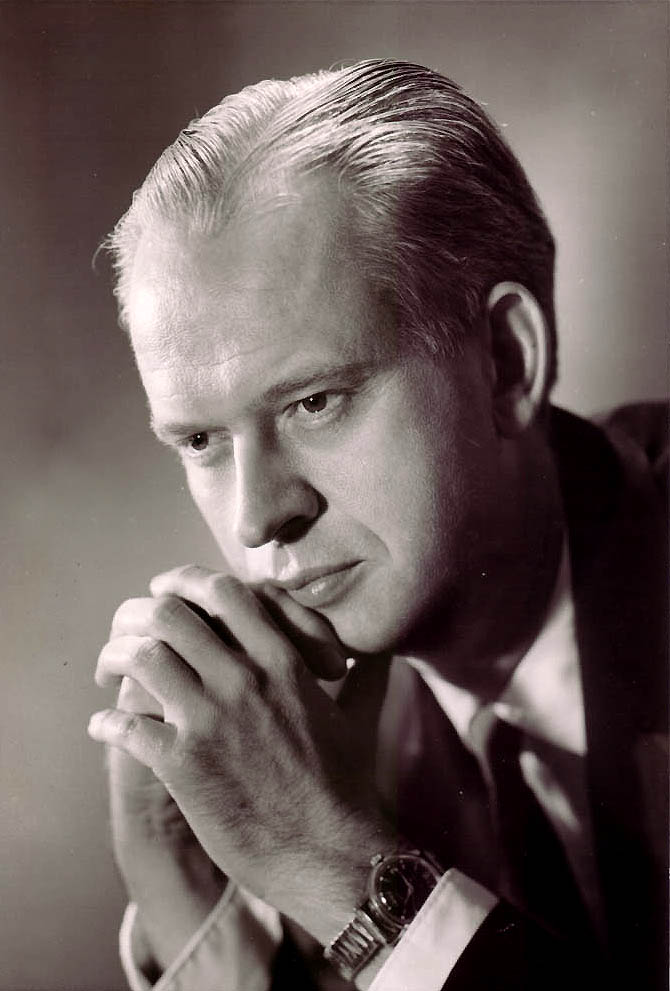 BD: Let me start by asking you
how the teaching of young composers has changed over that time.
BD: Let me start by asking you
how the teaching of young composers has changed over that time.
Kelly: In thirty years it changed quite
a bit. The styles of composition were changing during the
’50s and ’60s, and
some of the ’70s. There was a lot of
experimentation of writing, especially with electronic music, and
computer music, which I didn’t go into at all. There were other
teachers who did that, and there were students who were interested in
it, but there are still some students who are interested in the fundamentals
and the traditional background. That’s the kind of student
I liked to have. You have to have a foundation, or where can
you go?
BD: One of the quotes I read from you
said that a composer expresses his time by drawing on the trends of
the past, and utilizing them, while adding to that with the experimental
trends of the present.
Kelly: Yes, and I still believe that.
That was written a long time ago, when I was much younger in my teaching,
but I still believe it. You have to have a good foundation.
BD: How much should a composer keep
up with all of the trends that are happening today?
Kelly: He should be aware of them, and
listen to them, and participate in them, or experiment with some
of the ideas. Any time you compose, you’re experimenting.
It doesn’t make any difference what style it is.
BD: [Somewhat surprised] Really???
You’re even experimenting with old styles?
Kelly: Yes, sure.
BD: Do all of the experiments succeed?
Kelly: Oh, no! [Much laughter]
Some of them don’t even get past the paper, and to performance.
The composer has to decide when this is not good. I’m a disciplinarian.
As a teacher, and as a composer myself, I believe in choosing the best
that you can put out, and learn to discriminate what are good ideas and
what are bad. But that, of course, is only one person’s opinion.
When it gets out in the public, then there are the critics and others
with their own opinions.
BD: How do you decide what you feel
is good and what you feel is bad? What criteria do you use
in making those choices?
Kelly: I still like to have some kind
of lyric quality to my music, for one thing, and I like to have rhythmic
drive. A lot of those are things composers in the past thirty
years have thrown away. They feel it’s old hat. You shouldn’t
have rhythmic drive, and you shouldn’t write things that have key centers
or tone centers. You shouldn’t write anything that’s already been
written before. However, I don’t see how you can avoid this.
A long time ago, Edison said there’s no such thing as a new melody.
I don’t know how to take that, but there’s not a lot of things that are
new. The new things come from your own personality. When you
put your personality and your thoughts into it, it can be a new in a way,
but it will have a lot of resemblance of other composers, or other poets,
or writers.
BD: Should it be old ideas used in new
directions?
Kelly: Yes, yes.
BD: Do you feel that you are part of
a line of composers, that your music fits into a line of established
composers?
Kelly: That’s hard for me to say.
I don’t feel I go along with the trends of my colleagues. There
were about six or seven trends going at the same time when I was teaching
composition, and I don’t feel I follow any of them.
BD: Do you feel that you follow the
famous forebears in music?
Kelly: Oh, yes. I’m influenced
a lot by other composers. In the early days, it was Stravinsky
and Bartók, but not so much of Webern and the Schoenberg School.
That never appealed to me too much.
BD: You say your music always has tonal
centers and lyricism. Is your music, perhaps, easier for the
public to grasp than something that is more complex?
Kelly: I think so, yes. It depends
on which public is listening. It might be a public that doesn’t
like any kind of classical music, and they don’t even understand it.
Or, it might be a public that enjoys listening to ideas, but not
as far as going into avant-garde or electronic experimental music.
Those are on the other side of the spectrum.
BD: Do you write for any specific public,
or do you write for yourself?
Kelly: It’s a combination. I write
for myself, naturally. Most composers do. But I also write
for other people to enjoy, as well as playing it, and listening to it.
My music is not easy to understand on first hearing. It takes
a long time for some people, but I want people to listen to the music.
I don’t see any use in writing music that you’d feel nobody cares about.
I’m going to write this as I want. I think Charles Ives did that
in a lot of cases... he wrote just what he wanted to, and he didn’t care
whether anybody heard it.
BD: So you care very much about people
listening to it?
Kelly: Oh, yes. It’s a waste of
time if you don’t communicate. Music is a communication vehicle,
and if you don’t communicate to another person, what good are you?
If I had talked to you today in a foreign language, you wouldn’t even
understand what I’m talking about. So, what good would the conversation
be?
BD: It would be a waste of time.
Kelly: Yes!
BD: What do you expect from the public
that comes to hear your music?
Kelly: I hope they will come to hear it
in the first place, and if they don’t like it, why is that? They
can say something to me if they want to, or not say anything.
I’ve had some people say to me, “I don’t like what
you’re writing.” I asked why, and they responded,
“You’re just like all the rest of these composers
around here. I can’t understand it.”
When they say that, I understand right away that they don’t understand
anything that’s new. They feel I’ve got to write like Tchaikovsky
and Brahms, and this I refuse to do. [Both laugh] Brahms
is already done. I studied with a teacher who was fifty years
my senior at the Curtis Institute of Music, and I guess you could call
him a pupil of a pupil of Brahms. His music sounded like Brahms,
and he wanted all his students to write music sounding like Brahms.
Well, I did it up to a point, but after that I didn’t make it like that
anymore.
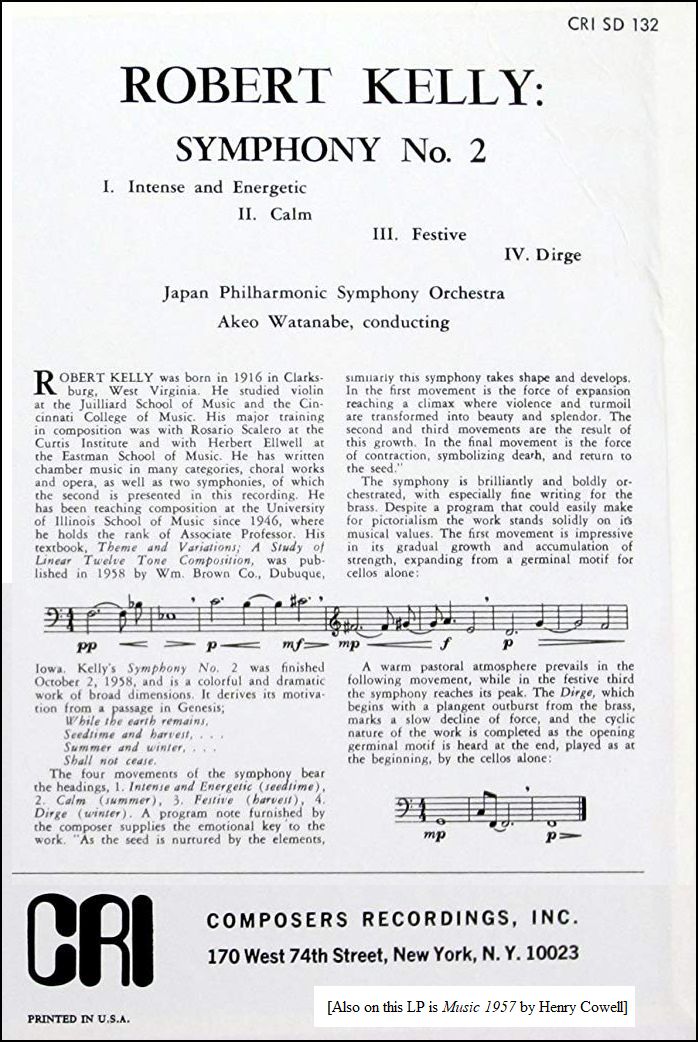 BD: You went off into your own style?
BD: You went off into your own style?
Kelly: Yes, and the same thing was true
of Hindemith’s teaching. I didn’t study with Hindemith, but
I knew him, and I knew his students. He expected you to write
like Hindemith. That’s one of the things I refused to do when
I was a teacher — to have my students
to write like me. I didn’t want them to do that. I want them
to demand the techniques, the discipline of composing and, after a couple
of years, they go off on their own. If I didn’t like what they wrote,
or I couldn’t feel I was qualified to criticize it, they could study with
someone else, because we had a variety of teachers at the University
of Illinois.
BD: This is one of my favorite questions
to ask composers, who especially those who are teachers and professors
of composition. Is musical composition something that
can be taught, or must it be something that is innate to the young
composer?
Kelly: I don’t know whether you can really
teach composition. You can teach some students the techniques,
the basics and ideas on how to organize, or you might even let them
know some of your inner secrets of how you put a piece together.
But actually, a person learns to compose by himself, really. I
never thought that the teachers I studied with actually helped me to be
a composer. They helped me to learn the techniques.
BD: They helped you to be a musical
craftsman?
Kelly: Yes.
BD: In musical composition, how much
is technique, or craft, and how much is inspiration?
Kelly: It’s hard to say. Usually
you come out with fifty-fifty, but I never thought much about it, one
way or the other. I know it’s been a while since I studied composition,
so I was always shaping it a bit to write what I want to write, and
the teacher would say I was sounding like this other person.
I was accused of sounding like Roy Harris, and it didn’t sound like
Roy Harris or anything else. If I sounded like anything, it was
a little bit impressionistic, and somewhat a mixture of Impressionism
and Romanticism. I would say that my music today is still that,
but in a different way, in a more mature way.
BD: You’ve been composing for fifty
years or so. How has your music changed over the half-century?
Kelly: A lot of it has to do with organization,
and how I structure it. I learned a lot of things on my own
since I’ve been teaching. If you want to talk about experiments,
I’ve experimentally talked on music in my own way, and even that has
changed in the last thirty years, as to the approach to it. Listen
to the Second Symphony. That, and the Patterns for Soprano
and Orchestra are similar in a way. It’s what I call ‘linear
twelve-tone composition’. All the
notes are not part of the twelve-tone series, but it’s handled more
in my linear way, like the Cantus Firmus in old times. There
you have any part of a given melody, but now the melody would be a
twelve-tone melody, and the other voices that are counterpoint and harmony
against it are a free choice. Now I’m beginning to change some
to something else, and it brings us a little closer to Webern and Schoenberg,
but not completely. I start working in what I call ‘subsets’.
BD: Was it a conscious effort to move
towards Schoenberg or Webern, or was it was just an evolution of your
music?
Kelly: I’m quite a believer in evolution
of creative ideas, as well as evolution in nature. I’m a student
of nature and religion, so those have all influenced my writing.
That’s why I had that connection to Kahlil Gibran, and his first innocent
touch with God. He’s a creative artist, too. He’s not
only a writer, but he did some sculptures and things like that.
BD: Did you branch out into painting
or anything else?
Kelly: No. I could have, but I
just didn’t want to spend that kind of time. It’s hard to tell...
BD: [With hopeful anticipation] Maybe
you’ll get to it yet...
Kelly: [Laughs] Well, I don’t suppose
so. I had a student... you probably know him, Jan Bach.
BD: I have not met him yet. [I
would interview him four years later, in 1990, and it has been transcribed.
Click the link above to read that conversation.] Didn’t
he write a short opera for the New York City Opera when they did
a triple bill of new works? [This was The Student from Salamanca,
and was presented in 1980.]
Kelly: Yes. He won a prize for it.
He’s teaching at Northern Illinois University now. When
he studied with me, he was torn between wanting to be a painter or a
composer, and for a couple of years he didn’t know what to do.
He still dabbles in artistic things, like sketchings, and pen-and-ink.
But you have to make a decision if you go into these fields. I never
had too much of a decision to make, whether to a professional musician
as a performer or a composer, or both. I chose to go into composition,
which was stronger than performance... though I still perform on violin
and viola. I’m a string player, and I love to write string music.
In fact, I have a new string piece that is going to be premiered here
next Fall. I’m getting back to some of my folksong ideas, which I
wrote back in the late ’40s and early ’50s.
I kept the tune of Shenandoah, and have now set it for
strings. I’ll probably premiere it next Fall.
BD: Is your writing for strings more
idiomatic than, say, for woodwinds or percussion?
Kelly: I don’t know. I don’t think
so. I’m also a clarinetist, so I know woodwinds, and I play a
little piano. I’m also very much interested in percussion.
We have had a wonderful percussion here over all the years.
BD: Is this something you encourage
your students of composition to do — actually
learn to play many of the instruments they’re going to write for?
Kelly: Yes, but not to the extent that
Hindemith did. Hindemith was supposed to have been able to play
all these instruments that he wrote for.
* * *
* *
BD: Let me ask you about the influence
of electronics. This is a two-edged sword. First, let
me ask you about the influence of home consumer electronics, and how
has this influenced either composers or audiences over the years.
Kelly: You’re talking about electronic
music?
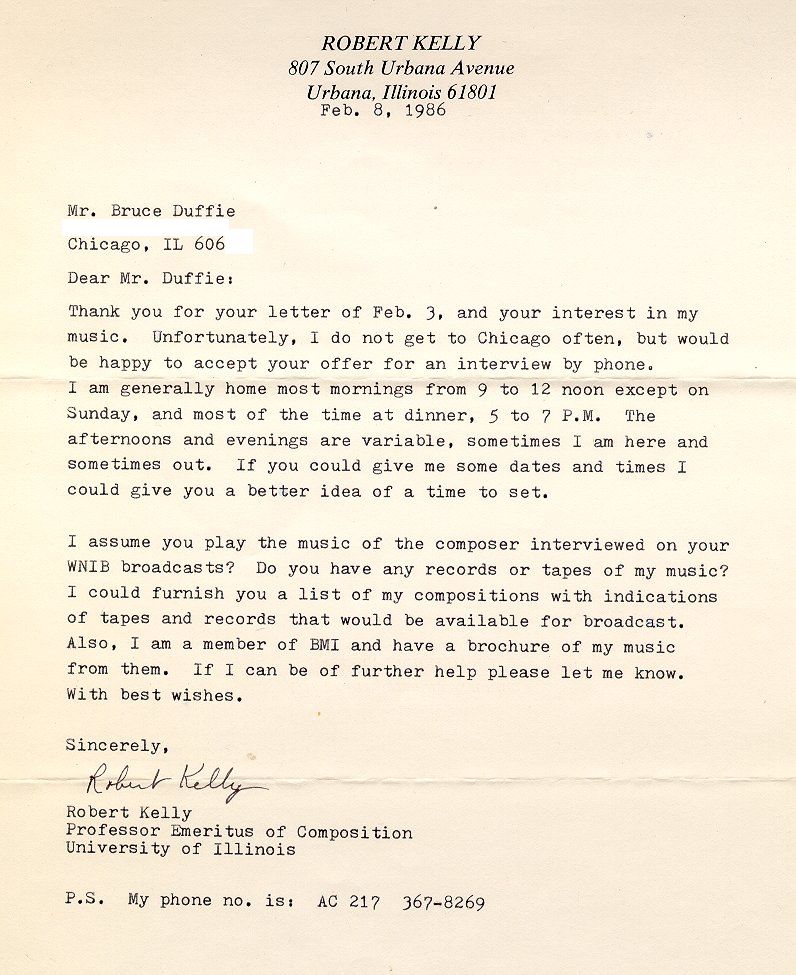 BD: No, that is the second edge of the sword.
Firstly, the home stereo systems, and the great proliferation of home
music systems. How has this influenced audiences or composers,
either good or bad, or both?
BD: No, that is the second edge of the sword.
Firstly, the home stereo systems, and the great proliferation of home
music systems. How has this influenced audiences or composers,
either good or bad, or both?
Kelly: I think it’s a great influence,
because you get a chance to hear the composition more than once, indeed
many times. Composers study other composers by playing their
music over while looking at the scores to see what they’ve done.
I’ve looked at a lot of George Crumb’s music.
George and I are very good friends. In fact, we’re from the
same state, West Virginia. I’ve always been very much interested in
George’s music... not that I would write like he does. He’s younger
than I am, and I have a lot of respect for him. He hasn’t gone over
into using electronic computer ideas or music... at least he hadn’t the
last time I talked to him. [Both laugh]
BD: One never knows where one’s imagination
is going to lead.
Kelly: Yes. I don’t think George
has to do that because can get sounds from a few instruments that
he finds of his own, like musical stones and things like that.
He can dig up sounds that you can’t even do with electronic music.
BD: When you’re writing a piece, are you
ever surprised where it winds up, where the composition leads you?
Kelly: Not too much.
BD: At the beginning, when you set out
to write a piece, do you know where it will eventually go?
Kelly: Yes, yes. That’s why I
say I’ve learned an awful lot of how to construct and organize music
in the last thirty years. In fact, I have based a lot of that even on
the early training I had. I can hear what I’m writing, and I
know how long this piece is supposed to be, or that I’d like it to be,
and the sounds that come out of it. Once in a while, I’ll experiment
with something, some combination that I never used before, and I just
have to use my imagination to see if this is what I want. When I
hear it, it’s pretty close to what I had thought it would be. No,
I don’t seem to have too much trouble there.
BD: You write so-called ‘classical
music’. Is classical music art or
entertainment?
Kelly: I think it’s art. Popular
music is entertainment.
BD: Is there a place for both in society?
Kelly: Oh, sure!
BD: Do you feel that classical music
should be entertaining at all?
Kelly: Oh, yes, it should be entertaining,
but not in the same sense as popular music. I Just listened
last night on the radio to some of Irving Berlin’s old tunes that they
were playing. Some of them I really think are great works.
It just surprises me and shocks me to think he could never read music.
He used his piano, but only played in one key. He had to crank
it when he wanted to change into other keys. [Berlin played
almost entirely in the key of F sharp so that he could stay on the black
notes, and owned three transposing pianos so as to change keys by moving
a lever.] Berlin had a lot of creative ideas, not
only in the music but in the words. I don’t know whether you know
much about Berlin, but he wrote his own words and music.
BD: Speaking of words, you’ve done a
couple of operas. Have you also written some songs and choral
works?
Kelly: Yes.
BD: Have you set your own words?
Kelly: Some, but not too much.
If possible, I’d rather find the poetry I like, and see if says something
to me.
BD: I want to come back to your own works
in a moment, but let me pursue this business of pop versus classic a
little bit more. Is it a mistake for audiences who go to symphony
concerts every week to draw an imaginary line between classical and
popular music?
Kelly: I don’t know. [Laughs]
BD: It seems that classical aficionados
all look down their noses at rock music.
Kelly: It depends on how far you want
to go in popular music. If you’re going into rock, and acid
rock, they’ll not want to hear it because it’s so monotonous.
BD: Have we really made a third division,
after classical and pop, and then rock?
Kelly: Yes, I think rock is something different
than popular music. When you’re talking about Jerome Kern and
Berlin, that’s one thing. But when you’re talking about others,
I mean a rock composers, all I can say is I don’t understand it. It’s
boring, and I don’t want to hear it. I don’t know how you feel
about it...
BD: I find myself not listening to very
much of it at all.
Kelly: You can’t help hearing it, as
there’s so much of it.
BD: That’s right. There’s an
over-proliferation of it.
Kelly: I won’t go into that...
BD: [With a gentle nudge] Oh why
not??? Please do! [Both laugh]
Kelly: Well, my reaction to it means
nothing now. I’d rather give reactions as to why I think serious
music writing is better than writing rock music. I have a lot
of respect for the guys who want to do rock, but I think they’re only
in it for the money.
BD: It’s just a commercial venture?
Kelly: If they can’t make the bucks out
of it, this is why it will die. That’s what happening to all this
recording business. When they’re not selling records, it’s going
to hurt all of us. Of course, the video things are coming out,
and they are all taping things.
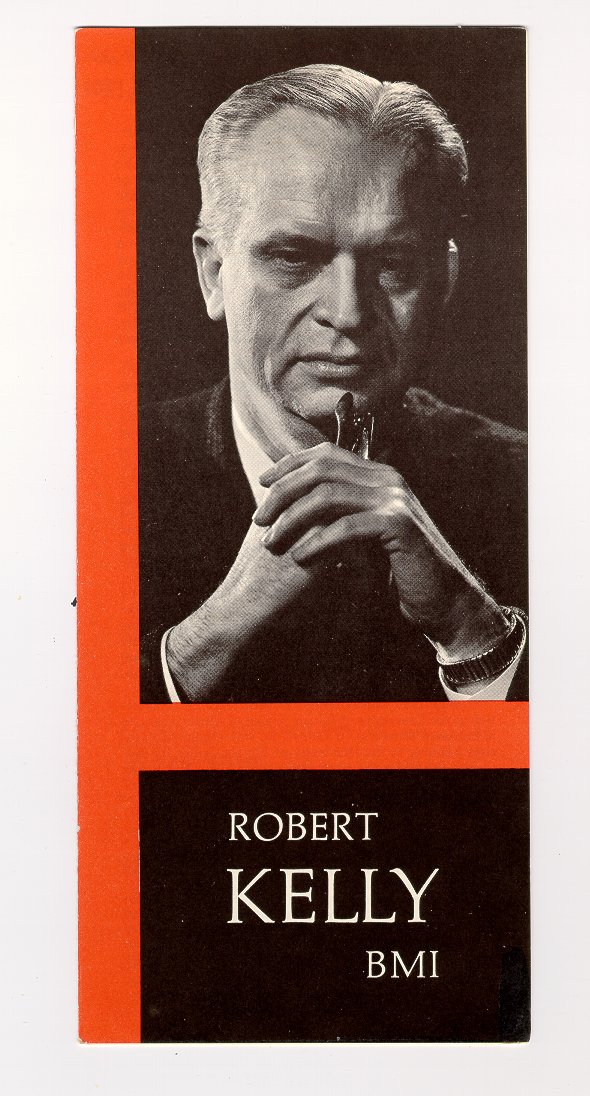 BD: Why do you say, “It’s
going to hurt all of us”?
BD: Why do you say, “It’s
going to hurt all of us”?
Kelly: I’m
a BMI composer, and they’re quite worried about passing laws in Congress.
Eventually it’s going to hurt the serious composer because we
get some monies from BMI, and the money comes from pop and rock music.
[Laughs] So, we’re subsidized by the rock guys. [BMI
is a music-licensing organization, similar to ASCAP. One of my
friends, baritone Roger
Roloff, was married to Barbara Petersen, Vice-President of BMI,
and she helped set up this and several other interviews with her composers.]
BD: [With another gentle nudge] Maybe
you should secretly admire the rock guys for making all the money.
Kelly: Ah, no! I don’t care what
they do. You can’t sell me any rock music if I don’t want it.
BD: Let me go back to your idea of
just a moment ago. Why is writing serious music better?
Kelly: It’s better for me, and it’s better
for other composers, most of whom are associated with university situations,
because you’re putting out your feelings for others to enjoy, or
to listen to, and be curious about. It’s just the satisfaction
you get. I compose only because I get satisfaction from creating.
If I never got a performance, or if no one ever paid attention
to me, I think I’d still write. I don’t know... I haven’t quite reached
that stage yet. [Both laugh]
BD: Has all of your music been performed?
Kelly: Most everything has been performed.
I’ve had a little trouble with this big opera.
BD: Let’s talk about that opera.
This is The White Gods?
Kelly: Yes. I had a grant from
the university for a year and a half.
BD: Was that enough time to work on
it?
Kelly: I got most of it done. It was
for a year, and I didn’t quite finish. I needed more time, so
they gave me another semester, and I still didn’t get it finished. But
they can only give out so many grants. They have to give other
people opportunity.
BD: Did you finish it up on your own,
or is it still left uncompleted?
Kelly: Oh, the opera’s finished. It’s
been finished, but the stage version’s never been performed completely.
I’ve had parts of it done in concert version, which has been a help
to promote it, but it’s going to be difficult to get it on stage because
of finances. I contacted many professional opera companies around
the country, and they’d be very happy to do it if I could raise the
funds. They cannot take it out of their budget, and so after a
while I get disappointed. Robert Ward is a good friend
of mine, and he said I’m trying to hit the top with it. He told
me to try to get it done in a university situation, like my own place
here at the University of Illinois. They would do it here, but they
can’t take it out of their budget to put it on, because it would cost from
$8,000 to $10,000 to do it. That would pay for some of the orchestral
musicians, the stage sets, the costumes, and maybe hire a few singers.
I’m not able to come up with $10,000. I’d like to, but I have
not found an angel yet.
BD: Is this something that will discourage
you from writing more operas?
Kelly: Yes. I’ve written two
operas, and one was the folk opera, which is a one-act. It
didn’t take much to put it on, and it was premiered in Norfolk, Virginia.
Then we did it here, and did it on TV. It didn’t take more
than a $1,000 to put it on. It’s a one-act opera, but I don’t
think I’ll write any more operas because I’m getting too late in life
to take on a big one. I have a poet friend of mine who desperately
wants me to write an opera to his text, and I said to him there’s no
way. I said he needs to get a young guy like Jan Bach, and see
what he’ll do.
BD: Are the monetary considerations
going to even discourage young people like Jan Bach from doing things
like that?
Kelly: So far he’s been doing pretty well,
and he’s writing a full-length opera right now. I’m just wondering
what problems he’s going to have. When you’ve got to put on a
full opera — a tragic opera with
all the forces including chorus, orchestra, and big sets
— you’re running into expense,
and I don’t recommend it for anybody today. It’s just too expensive.
BD: Would you set this man’s text to
music as an opera if the expense were not a problem?
Kelly: I doubt it.
BD: [Wistfully] If you won the
Illinois Lottery, would you then go and do it?
Kelly: [Laughs] If I won the Illinois
Lottery, I’d put The White Gods on. That’s my interest
right now. If there’s anything I want to do with that kind of
money, it is to put a reduction on of this work. I’d only do it
in the university situation where it would cost less, and not try to do
it professionally.
BD: Is this not something you would
want Lyric Opera of Chicago to produce?
Kelly: Oh, if you could get the funds,
I’d be very happy for it to be done there. I think it’s a great
opera. It’s sung all the way through. There are no speaking
parts in it at all. It’s about the Aztecs, and the conquest. It’s
a very colorful opera, and in this case, it’s a very rhythmic.
I assume you know Roger Sessions’ Montezuma. Well, this is
just the opposite of what Sessions did. Sessions is on the Spanish
Conquest, and mine is on the Aztec view of the Conquest. It’s an
entirely different thing regarding both in ideas and musically. Sessions
tried to write twelve-tone music, and Aztec music was not twelve-tone.
It was pentatonic, just like Oriental music. So, my opera, at least
for the Aztec Indian part of it, is pentatonic.
BD: You purposely used their kind of
music to give it that flavor?
Kelly: Yes, definitely. I did two years
of research on this, and I came up with a lot of good ideas.
I didn’t just work on this while I was on that grant. I worked
on it for several years before. A friend of mine wrote most of the
libretto. It was going to be a two-act opera, and I realized it
needed to be three acts. The first act to present the Aztec culture,
and I couldn’t get him to do any of it. By then, too much time had
gone by, so I wrote the libretto myself for that first act. I think
it can be a very successful opera, but you’ve got to have the forces for
it, and the money to put it on. Have you got any connections with
Lyric Opera?
BD: [Sadly] I just do interviews,
I’m afraid. I don’t have the ability to push works on the management.
Kelly: I don’t know how much they’re
interested in doing premieres. I know the Penderecki [Paradise
Lost] was a world premiere... [That work was commissioned
for the US Bicentennial (1976), but was delayed and premiered at Lyric
Opera in November of 1978, with the production taken to La Scala
two months later.]
The General Director of Lyric Opera,
Ardis Krainik,
presented what she called Toward the Twenty-First Century, an
initiative to present new works, as well as revivals of operas from earlier
in the Twentieth Century. Using both the main company, as well as
the Lyric Opera Center for American Artists, composers of premieres and
recent works included Philip Glass, Hugo Weisgall,
Dominick Argento,
William Bolcom,
Carlisle Floyd,
John Corigliano,
Gian Carlo Menotti,
Luciano Berio,
Anthony Davis,
Marvin David Levy,
John Harbison,
John Adams,
André Previn,
William Neil,
Leo Goldstein,
Bright Sheng,
Bruce Saylor,
and Shulamit Ran.
These last five were named as composers-in-residence, and besides
the other established composers mentioned, Gunther Schuller and
Stephen Paulus
assisted in the selection of the budding talent. Also of note
was critic Andrew Porter,
who wrote the libretto for the Sheng opera.
|
BD: [Trying to be helpful regarding a production
of The White Gods] Send it to Bruno Bartoletti.
He’s the Artistic Director and Principal Conductor of Lyric Opera.
Send to him a score and tapes of what’s been performed.
Kelly: Yes, well, I’ve done that for so many
places, and I get the same answer. They’d just love to do this,
but can I find funds for it? I’m the guy out there who has to
get the money. If I won the Lottery, as you said, there it is,
and we’d have it on stage. No question, and I could have my
own choice of opera company. [Laughs] They wouldn’t like
that, but if it’s my money, it’s the way it is. I’ve done things
like that before. I put out my own money, and in fact that’s how
the recording for cello came about. Orion wanted it, but I had to
put up the money, so I called the shots. I went down to Florida.
I had an engineer down there, and we did all the recording sessions.
We came up with a very fine tape. It’s just one of those records
that will not sell much. Who wants to listen to a pile of cello
music?
BD: But you yourself are pleased with
the result?
Kelly: Oh, yes, the record is very good.
I’m just a little disappointed it in because Orion hasn’t been able
to move it and get critical reviews on it. I got a lot of good
critical reviews on the Second Symphony when that came out. Fortunately,
I didn’t have to put in money at all.
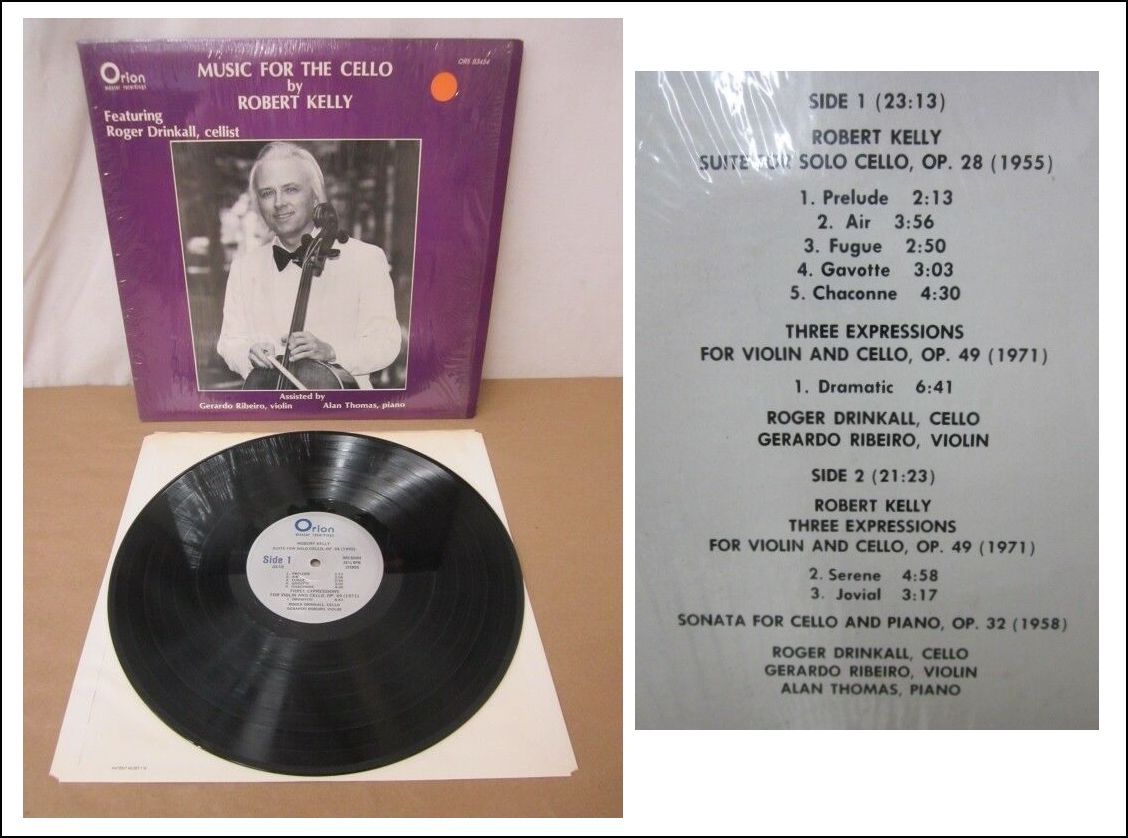
BD: What’s the role of the critic?
Kelly: To listen to the music, and be honest
about what he hears and how he feels. I don’t know what’s happening
with this cello record. Orion said that they sent out. They
gave me the list of twenty-five or thirty critics, and on the contrary,
it didn’t get one review. I just don’t understand it. It’s
either they don’t have much respect for Orion and what they put out, or
they’re just not interested in cello music. I really don’t know what
the racket is in this profession of critics, and getting records, and
writing reviews.
* * *
* *
BD: Your Second Symphony has been performed
a number of times under great conductors. Do you find that the
big-named conductors get more out of your music than perhaps university
orchestras, or university conductors?
Kelly: Oh, yes! The performances I’ve
had with Stokowski and Szell, and even Mitchell in Washington DC
have been great.
BD: Did they find things in your music
that even you did not know were there?
Kelly: I don’t really think so. They gave
it a better performance than a lot of others did. They were
very sympathetic with what I was trying to do. We had some discussions
during the rehearsals, asking questions, which I found were very helpful.
Even when Rafael Kubelik was here, he was very helpful, and made some suggestions.
So did Ansermet. I have a great respect for these people.
I will listen, and sometimes I’ll change something in the score because
they suggested it... and sometimes I won’t.
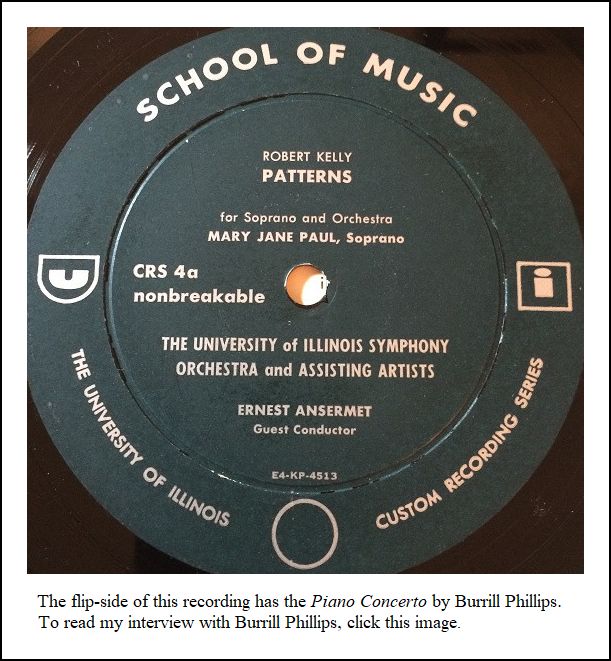 BD: What kinds of suggestions did they make?
BD: What kinds of suggestions did they make?
Kelly: When I was in Cleveland,
and George Szell was rehearsing the Miniature Symphony, he
asked me to come up on stage. So, I sat up there, and the first
thing he asked me was if I wanted to conduct. I said, “Goodness,
no! I came to hear you conduct it!”
I know a couple of guys in the orchestra, and they told me that I was very
wise. Most composers, when Szell does that to them, take the stick.
He knows exactly what he’s got to work with. The concert master,
Josef Gingold, made a couple of suggestions. I’m a violinist,
but he made a couple of suggestions about some bowings for the first
violin part, and they were marvelous. I thought it was great,
so I said to do it. The score was published shortly after that,
and his bowings are in there. I’ve had other suggestions. When
we did Patterns, Ansermet made some suggestions about the trumpet
part. A lot of it had to do with dynamic levels being too high
for this particular passage. I said his ideas were fine, and later I changed
it in the score. Kubelik made a suggestion in the Miniature
Symphony. In the last movement, which was in 4/8, he said it
would be much better just to change the 4/8 to 2/4 meter, and he conducted
it that way. We tried it, and it was a good idea. So, that’s
the way it came out when it was published. You can learn a lot from
conductors and performers. They’ve been my teachers for all the years.
Like any student, you listen, you accept or you digest it, or maybe even
reject it. I’ve rejected ideas, too. Thomas Shepard used to
have a chamber orchestra in New York, and he was going to think about doing
Patterns after it came out. He wrote to me and said he liked
everything except the way I ended it. He said if I change it,
he could probably program it. So I wrote him back, and said I cannot
change it. “It’s the way I feel about it,
so if you won’t perform it just because I won’t change it, that’s the
way it is.” So, he never performed it.
I wasn’t going to change the music, because it was the whole concept
of it at the end. It wasn’t me, it was him.
BD: That’s too bad. I’m sorry
that he wouldn’t at least give it a shot, even with the ending he
didn’t care for.
Kelly: That’s the way he felt about it.
My mind was made up. I would not change it just for a performance.
BD: Might you tamper with a detail here
and there, but not recast the last five minutes?
Kelly: Yes, but it wouldn’t have changed
the idea he wanted. I had a feeling maybe he didn’t like the
interpretation of it. But I’ve had other people come up
to me who knew Amy Lowell’s poem Patterns, and they said my piece
was a beautiful setting of it. It seemed to fit the words right,
and they were quite pleased with it. I have had more comments from
people on music where I’ve set poetry for songs and cantatas, which is
very gratifying to me when you get those kinds of comments from people
who know the texts. Walden Pond is a later work [called
an Environmental Cantata], for mixed chorus, percussion, flute, narrator
and soprano. I took the text from Thoreau, of course. You could
call Thoreau an environmentalist, and that’s the way I feel about life,
too. So, when I get great comments from people who feel the same
way about Thoreau as I do, I feel pleased.
BD: You sought out poetry that meant something
to you.
Kelly: Oh, yes. It was all my
idea to do this. I wasn’t commissioned. That’s where
I write my best music, when I just use my own ideas. Somebody
commissioned me to write a saxophone concerto. In the first place,
I’m not crazy about saxophone, and the second place I don’t care about
somebody paying me $2,500, which is too much, to write the kind of a
piece where he tells me how he wants it. He wants it this way, this
way, and that way, and I said I am not that kind of a composer.
I am not a tailor where you go in and order a suit.
BD: [Musing on the idea] It takes various
kinds of composers...
Kelly: Have you heard this kind of viewpoint
from many of them?
BD: Some of them take the commissions,
and try to work with the performer a little bit.
Kelly: Oh, I’m OK with that, but I don’t
feel it’s my best work after it’s done, because there’s another person
involved in it.
BD: For you, music is much more personal?
Kelly: Yes, yes, definitely.
BD: Do you expect your music to last, and be performed
a hundred years from now?
Kelly: Who’s going to say? I’m
having enough trouble to get it performed right now! [Both laugh]
Every composer feels the same way — that
he didn’t get as many performances as he would have liked.
BD: Are there enough young composers coming along...
or perhaps too many young composers?
Kelly: I got the surprise of my life when I became
a student of composition — and
then as a teacher — that there were
so many other American composers around the country. It overwhelmed
me that there were so many, and that’s never ceased. It’s
just multiplying like rabbits, even today. You see these lists
of younger composers coming up, and some of them are making it, some
of them are not. I’m talking about younger ones in their 20s and
30s.
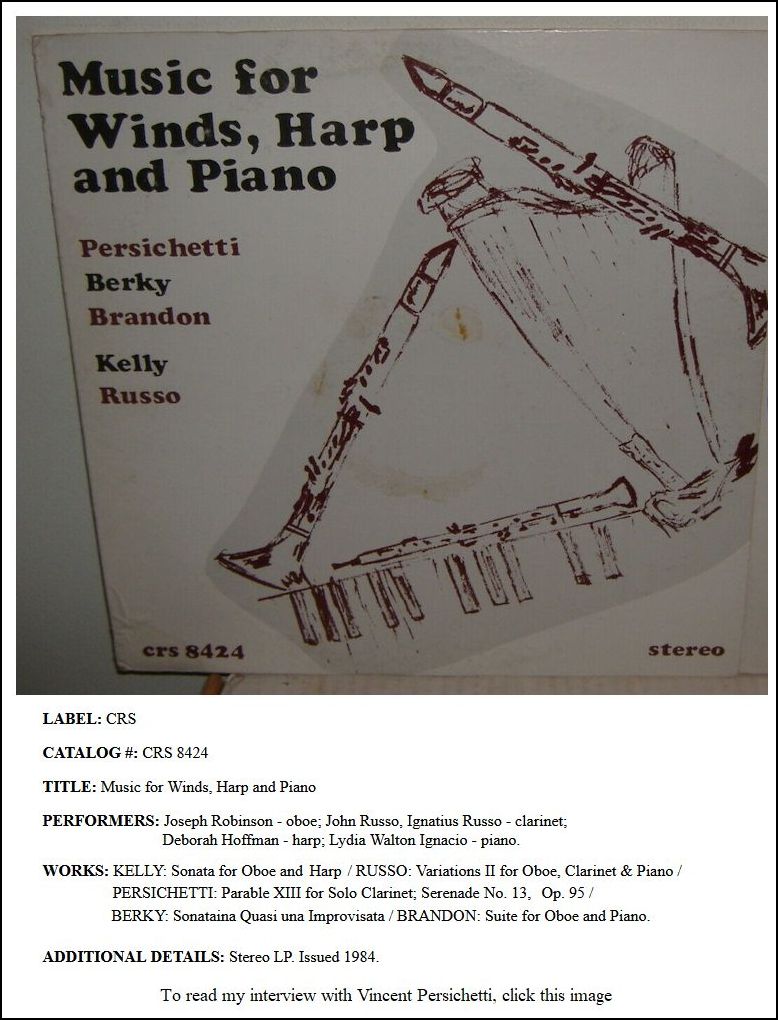 BD: Is there room for all of them, even the good
ones?
BD: Is there room for all of them, even the good
ones?
Kelly: What do you mean by room?
Enough to make a living?
BD: Yes.
Kelly: Then yes, if you can get into some kind
of a job that will give you money, like teaching or playing in a symphony.
I had two choices when I was coming up — either
teach, or play in a symphony. You can’t make it financially as
a composer, at least not too many can. Maybe Aaron Copland or
Samuel Barber, although Sam was teaching at Curtis when I was there.
But he didn’t make his money from composition.
BD: Are there some great composers
coming along? Is there another Aaron Copland in the pipeline?
Kelly: Who knows? It depends on the breaks
that you get. Even some of the best composers don’t get the breaks,
and some of the composers who have the talent don’t have the initiative,
or the push, to get out there and sell. It’s awfully hard to sell
the product when it is something that you’ve created... at least it is
for me. I’ve done very well with that, but I don’t feel I’ve done
as well as some people who stayed around in the New York scene.
I had a choice to make when I was younger — stay
around in the New York scene, or get out here in the cornfields of central
Illinois.
BD: Do you think you made the right
decision?
Kelly: Definitely, because it isn’t just for me
as a composer. It’s for me as a family man, and having children.
I could not see raising children in the New York area. I went
to school there for a while, and I know what the environment is.
I didn’t want to raise children in that kind of environment. It
just wasn’t fair to the children. You’ve got to think of somebody
else besides yourself. I’ve gotten quite a lot of breaks by not living
in New York. I’ve a lot of friends there, and I get some help with
performances. I’ve had more performances in New York than I’ve had
in the whole country, though I’ve had other spots where I’ve had a lot
of performances around the Mid-West, and a few in the South.
BD: Do you know all the performances
of your music that go on?
Kelly: No. I wish I did know, or that they’d
be reported to BMI, because we get credits for everything. Somebody
called me from New Jersey the other day... I have a work for piano and
percussion called Diacoustics [Op. 48] which is played quite a
lot in the percussion field. It’s a very difficult work, and it’s
a virtuoso-type piece, and they called me and they said they had lost some
of the parts. They wanted to know to get a hold of them. I said
I didn’t have any parts, but my publisher did. I asked if they had
a percussionist to perform it, and they said they’d been playing it.
I didn’t even know that this work was being performed. Sometimes
the information gets out in percussion magazines, which I go through, and
I see where things are performed.
BD: Does it ever surprise you that
a piece is being performed in some odd place?
Kelly: This piece does because it’s
very difficult. It was premiered in New York by the
Manhattan Percussion Ensemble. We had it done here, and a lot of
the big schools have percussion departments, and have done it.
But it still surprises me when it is done. They must have a
pretty good percussion department, that’s all I can say. It takes
fourteen or fifteen good players, besides a good pianist, and it runs about
twenty-two or twenty-three minutes. [After a slight pause]
I certainly appreciate all this. Is this supposed to be for
my seventieth birthday [which was coming up about six months hence]?
BD: Yes, that would be the first use. [At
this point we talked a bit about the specific pieces I would be able
to play on the radio, and he was sorry that Diacoustics was not
available on a commercial disc. The four LPs I had at that time
are shown on this webpage.]
Kelly: I hope you’ll do that Sonata (for oboe
and harp), even though it’s an old work. Joseph Robinson is
a great oboist, and the harpist is very good too.
BD: As I look at the various pieces,
this seems to be a nice balance — one
of the cello pieces, the Sonata, and then the Symphony.
That would make up a nice program, unless you object...
Kelly: Oh, I don’t object to anything
you’re going to do!
BD: Is it a good feeling to know that you are
going to be seventy?
Kelly: Yes. [Bursts out laughing] I
don’t pay much attention to age. It doesn’t mean a whole
lot to me. It depends on how you feel, and I’ve been feeling
very good. But age is kind of deceptive. You could be fifty
and feel washed out, or even younger, and you can be ninety and feel
great.
BD: I hope you get to be ninety and
still feel great.
Kelly: Thank you very much. I
hope you do too! [Much laughter] I appreciate you thinking
of me for your program.
========
========
========
--- --- ---
---
======== ========
========
© 1986 Bruce Duffie
This conversation was recorded on the telephone on March 8, 1986.
Quotations (read by BD) were included in programs on WNIB in 1986 and 1996.
This transcription was made in 2020, and posted
on this website at that time. My thanks
to British soprano Una Barry for her help
in preparing this website presentation.
To see a full list (with links) of interviews which have been transcribed
and posted on this
website, click here.
To read my thoughts on editing these interviews for print,
as well as a few other interesting observations, click here.
* * * *
*
Award -
winning broadcaster
Bruce Duffie was with WNIB, Classical
97 in Chicago from 1975 until
its final moment as a classical station in
February of 2001. His interviews have also
appeared in various magazines and journals since
1980, and he now continues his broadcast series on WNUR-FM, as
well as on Contemporary
Classical Internet Radio.
You are invited
to visit his website
for more information about his work, including
selected transcripts of other interviews, plus
a full list
of his guests. He would also like to call your
attention to the photos and information about his grandfather,
who was a pioneer in the automotive field more than a century ago.
You may also send him E-Mail with comments,
questions and suggestions.
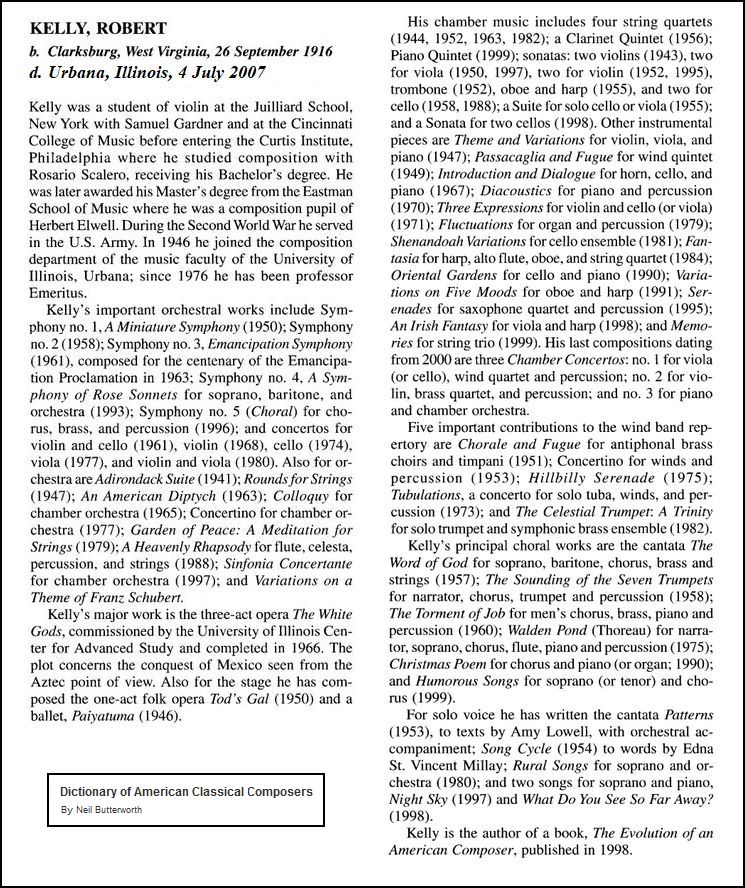

 BD: Let me start by asking you
how the teaching of young composers has changed over that time.
BD: Let me start by asking you
how the teaching of young composers has changed over that time. BD: You went off into your own style?
BD: You went off into your own style? BD: No, that is the second edge of the sword.
Firstly, the home stereo systems, and the great proliferation of home
music systems. How has this influenced audiences or composers,
either good or bad, or both?
BD: No, that is the second edge of the sword.
Firstly, the home stereo systems, and the great proliferation of home
music systems. How has this influenced audiences or composers,
either good or bad, or both? BD: Why do you say, “It’s
going to hurt all of us”?
BD: Why do you say, “It’s
going to hurt all of us”?
 BD: What kinds of suggestions did they make?
BD: What kinds of suggestions did they make? BD: Is there room for all of them, even the good
ones?
BD: Is there room for all of them, even the good
ones?